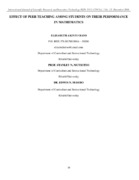| dc.contributor.author | Elizabeth, O. | |
| dc.contributor.author | Mutsotso, AN . | |
| dc.contributor.author | Masibo, Edwin NM. | |
| dc.date.accessioned | 2019-05-22T14:08:13Z | |
| dc.date.available | 2019-05-22T14:08:13Z | |
| dc.date.issued | 2016 | |
| dc.identifier.issn | 2313-3759 | |
| dc.identifier.uri | http://erepository.kibu.ac.ke/handle/123456789/1092 | |
| dc.description.abstract | Mathematics is a key subject in the school curriculum and is considered as critical filter for learners’ career
choices. However, over the years mathematics has been one of the poorly performed subjects in the Kenya
Certificate of Secondary Education (KCSE). In an attempt to improve performance, great effort has been put
into use of appropriate teaching and learning methods that stimulate learners’ interest in the subject. This
study was done in 12 randomly selected schools in Bungoma South Sub County. The objective of this study
was to determine the effect of peer teaching among students on their performance in mathematics in the
teaching and learning process. The study was guided by Vygotsky’s social interaction theory of learning. This
theory opines that social interaction plays a fundamental role in cognitive development and that all learning
occurs in a cultural context and involves social interactions where peers assist learners in developing new
ideas and skills. The target population was heads of departments, teachers of mathematics and form three
students. Twelve heads of department, twenty four mathematics teachers and one hundred and seventy six
form three students were drawn from the sampled schools to participate in the study. A descriptive survey
design was adopted for the study. Data was collected using a teachers’ questionnaire, students’ questionnaire,
interview schedule for heads of department and students’ achievement test. Data was analyzed using
Statistical Package for Social Sciences (SPSS) version 17.0 and Statistical t-test. The Students’ Achievement
test showed that peer teaching increases students’ achievement in mathematics and 100% of the heads of
department interviewed believe that peer teaching strategy improves performance. The conclusions made from
the study were that peer teaching encourages students’ motivation to learn mathematics, enhances
understanding of mathematics concepts and builds confidence in the students. Students should be allowed to
form discussion groups where peer teaching can be done especially at the end of every topic as it offers a
great opportunity in overcoming the challenge of a demanding mathematics curriculum. | en_US |
| dc.language.iso | en | en_US |
| dc.publisher | International journal of scientific research and innovative technology | en_US |
| dc.rights | Attribution-NonCommercial-ShareAlike 3.0 United States | * |
| dc.rights.uri | http://creativecommons.org/licenses/by-nc-sa/3.0/us/ | * |
| dc.subject | Peer teaching | en_US |
| dc.subject | Performance in mathematics | en_US |
| dc.subject | Social interaction theory | en_US |
| dc.title | Effect of Peer Teaching among Students on their Performance in Mathematics | en_US |
| dc.type | Article | en_US |

